
via Imago
Image Credits – Imago

via Imago
Image Credits – Imago
The roar of the crowd fades, the final whistle blows, and the spotlight falls on the victor. But beneath the glitz and glam of professional sports, a quieter battle often simmers: the one between athletes and the media. While these clashes may not be as dramatic as a game-winning shot, they can be just as intense, leaving both sides bruised and frustrated. Elena Rybakina’s recent tense exchange with the press at the French Open struck a chord with not only tennis fans but also for the former champion Andy Roddick.
Rybakina’s strained relationship with the media became evident after her first-round victory at Roland Garros, where she gave terse responses to reporters. This led to the media refraining from approaching her for interviews after her second-round win, a rare occurrence for a top athlete. While the situation normalized after the third round, it brought back memories for Andy Roddick.
Frustration boiled over for Andy Roddick at the 2010 US Open. Fresh off a second-round upset loss at his favorite tournament, the then-28-year-old reacted angrily to a disputed foot fault call. Incensed by the incorrect line call (left foot, not right as signaled), Roddick vented to the umpire and lineswoman, briefly escalating the situation. While replays confirmed a foot fault, it was ultimately the wrong foot that triggered his outburst.
ADVERTISEMENT
Article continues below this ad
Reflecting on an episode of Served with Andy Roddick, the 2003 US Open champion recounted: “It was a foot fault, but they said it was my back foot. Now, never once in my life, have I brought my back foot up. So that is an actual impossibility”. This confrontation left him frustrated, and when he faced the press afterward, he encountered similar tensions. “Not once in my entire career has my right foot gone ahead of my left foot,” Andy said back when the foot-fault controversy happened. “Ever,” he further stressed.
Full press conférence of Elena Rybakina today after her R1 win.
"The questions are quite the same so i dont what to say anymore ""Simple questions, Simple answers, so guys something else ?"#rolandgarros pic.twitter.com/KEZAw4GuoH
— Sebastien G. (Main account was suspended) (@sebsharfam2) May 28, 2024
Then-fuming Roddick stormed off court, muttering curses. Upon his return, the lineswoman had vanished, replaced by another. Roddick, in his recent discussion, claimed that the journalists were attempting to frame him as sexist due to his disagreement with the female umpire. “And it was apparent to me that because the umpire who made the mistake was a female, the angle was trying to get me to you exploded on her and didn’t give her respect because you are sexist,” he said.
Andy offered a glimpse into the world of press conferences, highlighting two types of journalists. There’s the prepared pro who arrives with a well-researched line of questioning, and then there’s the other kind… the one who walks in empty-handed, guaranteed to drive anyone bananas! Feeling unfairly targeted, he confronted the journalist and refused to participate in the narrative. “I said, I know what you’re trying to do. You have your story written. You just need me to participate in your narrative, and I’m not going to do it.”
He further expressed his frustration with how the media can twist stories to fit their agendas, leading to strained relationships between athletes and the press. Acknowledging that such situations can cause athletes to lose their composure, Roddick seemed to empathize with the Kazhak’s ordeal. He emphasized how certain questions from the press can agitate players, leading to unpleasant interactions. Ultimately, Roddick’s experience sheds light on the challenges athletes face when navigating their relationship with the media in the heat of competition.
ADVERTISEMENT
Article continues below this ad
Andy Roddick is certainly not the only person to stand for Elena. She has received support from multiple stakeholders in the Tennis community.
Elena Rybakina’s post-match behavior did not receive only flak
The World Number 4 found support from various quarters in the tennis community following her post-match behavior. After her half-hearted responses to the media, significant stakeholders, including major tennis publications like Tennis Letter, defended her actions. They emphasized that Rybakina shouldn’t feel obligated to maintain a cheerful attitude in press conferences and that it’s understandable if she grows tired of repetitive questions.
ADVERTISEMENT
Article continues below this ad
“Elena Rybakina does not need to fake a happy attitude in press in order to be good at her job, which is playing tennis. If Elena Rybakina is bored with answering repetitive questions in press, there’s nothing wrong with her expressing that,” the statement read. In addition to official endorsements, many fans also rallied behind the World No. 4, echoing their support for her attitude and standing firmly by her side.
The incidents involving Elena Rybakina and Andy Roddick shed light on the complex relationship between athletes and the media. While conflicts are rare, they can arise under pressure, leading to tense interactions. As for the ongoing French Open, Rybakina faced a defeat in the quarterfinals against Jasmine Paolini, thereby marking an end to her venture at Roland Garros.
ADVERTISEMENT
ADVERTISEMENT
ADVERTISEMENT
ADVERTISEMENT


